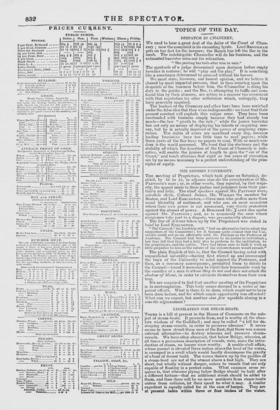TOPICS OF THE DAY.
DESPATCH IN CHANCERY.
WE used to hear a great deal of the dekly of the Court of Chan- cery ; now the complaint is its exceeding haste. Lord BROUGHAM gets on too fast for the lawyers; the Bench has left the Bar in the lurch. The indefatigable Chancellor will do his business, and the exhausted barrister cries out for relaxation.
" The panting bar toils after him in vain."
The spectacle of a judge determined upon decision before empty benches is curious; he will "play out the play." It is something like a coachman determined to proceed without his horses.
We must state, however, our honest opinion, and we believe it shared by most impartial persons, that in thus insisting upon the. despatch of the business before him, the Chancellor is doing his duty to the public ; and the Bar, in attempting to baffle and con- found him by their absence, are acting in a manner too consistent with that reputation for utter selfishness which, unhappily, they have generally acquired. The leaders of the Chancery and other bars have been enriched under the false idea that they were indispensable: we trust that their present conduct will explode this vulgar error. They have beett overloaded with business simply because they had already too much-the law " giveth to the rich ;" while the junior barrister has not only no means of displaying his talents or acquiring mo- ney, but he is actually deprived of the power of acquiring expe- rience. The rights of cases are sacrificed every clay, because leading barristers have too little time to read papers ; while three parts of the Bar have no papers to read. With so much wis- dom is the world governed. We trust that the obstinacy and the stolidity of which the desertion of the Court of Chancery is indi- cative, will enable the juniors at length to gain the " ear of the Court," and teach attornies that eight or ten years of starvation are by no means necessary to a perfect understanding of the prin- ciples of equity.


























 Previous page
Previous page